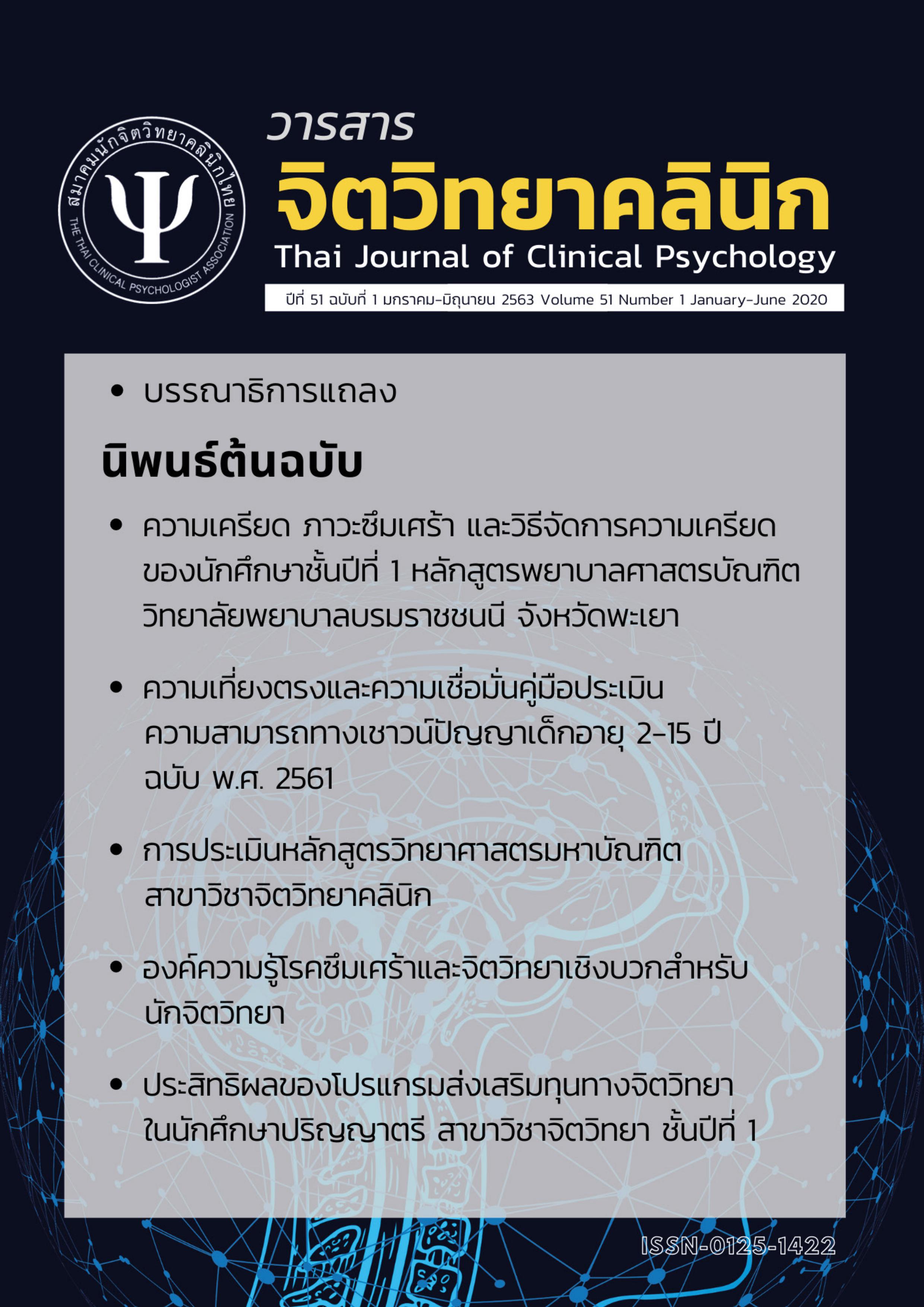ประสิทธิผลของโปรแกรมส่งเสริมทุนทางจิตวิทยา ในนักศึกษาปริญญาตรี สาขาวิชาจิตวิทยา ชั้นปีที่ 1
Main Article Content
บทคัดย่อ
วัตถุประสงค์ เพื่อศึกษาประสิทธิผลของโปรแกรมส่งเสริมทุนทางจิตวิทยาในนักศึกษาปริญญาตรี สาขาวิชาจิตวิทยา ชั้นปีที่ 1 มหาวิทยาลัยรัฐบาลแห่งหนึ่ง
วัสดุและวิธีการ การวิจัยเชิงทดลองแบบ pretest-posttest control group design กลุ่มตัวอย่างเป็นนักศึกษาปริญญาตรี สาขาวิชาจิตวิทยา ชั้นปีที่ 1 จำนวน 17 คน โดยแบ่งเป็น 2 กลุ่ม คือ กลุ่มทดลองจำนวน 9 คน และกลุ่มควบคุม จำนวน 8 คน เครื่องมือที่ใช้ในการวิจัย คือ โปรแกรมส่งเสริมทุนทางจิตวิทยาและแบบประเมินทุนทางจิตวิทยาสำหรับคนไทย สถิติที่ใช้ คือ ค่าเฉลี่ย ส่วนเบี่ยงเบนมาตรฐาน และการเปรียบเทียบค่าเฉลี่ย t-test
ผลการศึกษา 1) นักศึกษาปริญญาตรี สาขาวิชาจิตวิทยา ชั้นปีที่ 1 ที่เข้าร่วมโปรแกรมส่งเสริมทุนทางจิตวิทยามีทุนทางจิตวิทยาสูงขึ้นกว่าก่อนเข้าร่วมโปรแกรมส่งเสริมทุนทางจิตวิทยา (t = -17.883 , p ≤ .01) และ 2) นักศึกษาปริญญาตรี สาขาวิชาจิตวิทยา ชั้นปีที่ 1 ที่เข้าร่วมโปรแกรมส่งเสริมทุนทางจิตวิทยามีทุนทางจิตวิทยาสูงกว่านักศึกษาปริญญาตรี สาขาวิชาจิตวิทยา ชั้นปีที่ 1 ที่ไม่ได้เข้าร่วมโปรแกรมส่งเสริมทุนทางจิตวิทยา (t = -9.778, p ≤ .01)
สรุป โปรแกรมส่งเสริมทุนทางจิตวิทยาน่าจะช่วยเพิ่มทุนทางจิตวิทยาในกลุ่มนักศึกษาปริญญาตรี สาขาวิชาจิตวิทยา ชั้นปีที่ 1
Article Details
เรื่องที่ลงตีพิมพ์ในวารสารจิตวิทยาคลินิกแล้วถือเป็นลิขสิทธิ์การเผยแพร่โดยวารสารจิตวิทยาคลินิกแต่เพียงผู้เดียว การตีพิมพ์หรือเผยแพร่ซ้ำในที่อื่นต้องได้รับอนุญาตจากกองบรรณาธิการวารสารฯ
เอกสารอ้างอิง
หฤทัยทิพย์ ตัณฑเทศ, สุชีรา ภัทรายุตวรรตน์, และวิชัย มนัสศิริวิทยา. (2557). การพัฒนาแบบประเมินต้นทุนทางจิตวิทยาในคนไทยวัยทำงาน. วารสารสมาคมจิตแพทย์แห่งประเทศไทย, 59(1), 73-83.
American Psychological Association. (2013). APA guidelines for the undergraduate psychology major: Version 2.0. Retrieved from http://www.apa.org/ed/precollege/undergrad/index.aspx
Auerbach, R. P., Mortier, P., Bruffaerts, R., Alonso, J., Benjet, C., Cuijpers, P., Demyttenaere, K., . . . WHO WMH-ICS Collaborators. (2018). WHO World Mental Health Surveys International College Student Project: Prevalence and Distribution of Mental Disorders. Journal of Abnormal Psychology, 127(7), 623-638.
Avey, J. B., Wernsing, T. S., & Luthans, F. (2008). Can positive employees help positive organizational change? The Journal of Applied Behavioral Science, 44(1), 48–70.
Avey, J. B., Luthans, F., Smith, R. M., & Palmer, N. F. (2010). Impact of positive psychological capital on employee well-being over time. Journal of Occupational Health Psychology, 15(1), 17–28.
Bacchi, S., & Licinio, J. (2017). Resilience and Psychological Distress in Psychology and Medical Students. Academic Psychiatry, 41, 186-188.
Duckworth, A. L., Steen, T. A., & Seligman, M. E. P. (2005). Positive psychology in clinical practice. Annual Reviews of Clinical Psychology, 1, 629-651.
Ertosun, O. G., Erdil, O., Deniz, N., & Alpkan, L. (2015). Positive Psychological Capital Development: A Field Study by the Solomon Four Group Design. International Business Research, 8(10), 102-111.
Kleespies, P. M., Van Orden, K. A., Bongar, B., Bridgeman, D., Bufka, L. F., Galper, D. I., . . . Yufit, R. I. (2011). Psychologist suicide: Incidence, impact, and suggestions for prevention, intervention, and postvention. Professional Psychology Research and Practice, 42(3), 244-251.
Kessler, R. C., Berglund, P., Demler, O., Jin, R., Merikangas, K. R., Walters, E. E. (2005). Lifetime prevalence and age-of-onset distributions of DSM-IV disorders in the National Comorbidity Survey Replication. Archives of General Psychiatry, 62(6), 593-602.
Larson, M. D., Norman, S. V., Hughes, L. W., & Avey, J. B. (2013). Psychological capital: a new lens for understanding employee fit and attitudes. International Journal of Leadership Studies, 8(1), 28-43.
Luthans, F., Luthans, K. W., & Luthans, B. C. (2004). Positive psychological capital: beyond human and social capital. Business Horizons, 47(1), 45–50.
Luthans, F., Avey, J. B., Avolio, B. J., Norman, S. M., & Combs, G. M. (2006). Psychological capital development: toward a micro-intervention. Journal of Organizational Behaviour, 27, 387-393.
Luthans, F., Avolio, B. J., Avey, J. B., & Norman, S. M. (2007). Positive psychological capital: Measurement and relationship with performance and satisfaction. Personnel Psychology, 60(3), 541–572.
Luthans, F., Youssef, C. M., & Rawski, S. (2011). A tale of two paradigms: the impact of psychological capital and reinforcing feedback on problem solving and innovation. Journal of Organizational Behavior Management, 31, 333–350.
Luthans, F., Carolyn, M. and Youssef-Morgan. (2017). Psychological Capital: An Evidence-Based Positive Approach. Annual Review of Organizational Psychology and Organizational Behavior, 4, 339-366.
Lyubomirsky, S., King, L., & Diener, E. (2005). The benefits of frequent positive affect: Does happiness lead to success? Psychological Bulletin, 131, 803–855.
Peterson, S. J., Luthans, F., Avolio, B. J., Walumbwa, F. O., & Zhang, Z. (2011). Psychological capital and employee performance: a latent growth modeling approach. Personnel Psychology, 64(2), 427–450.
Pozos-Radillo, E., Preciado, S. L., Plascencia-Campos, A. & Rayas-Servín, K. (2015) Chronic Stress and Its Association with Psychological, Behavioral and Physiological Variables of Mexican College Students. Advances in Applied Sociology, 5, 299-305.
Russo, S. D., & Stoykova, P. (2015). Psychological Capital Intervention (PCI): A Replication and Extension. Human Resource Development Quarterly, 26(3), 329-347.
Seligman, M. (2006). Learned Optimism: How to change your mind and your life. New York: Vintage Books.
Selvaraj, P. R. & Bhat, C. S. (2018). Predicting the mental health of college students with psychological capital. Journal of Mental Health, 27(3), 279-287.
Snyder, C. R. (2000). Hypothesis: There is hope. In C. R. Snyder (Ed.), Handbook of hope: Theory, measures, and applications (p. 3–21). Academic Press.
Snyder, C. R. (2002). Hope theory: Rainbows in the mind. Psychological Inquiry, 13(4), 249–275.
Snyder, C. R., Lopez, S. J., & Pedrotti, J. T. (2011). Positive psychology: the scientific and practical explorations of human strengths (2nd ed). California: SAGE Publication.


